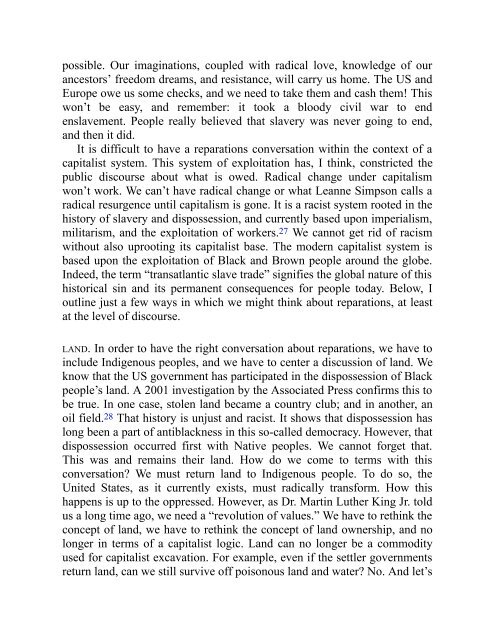You also want an ePaper? Increase the reach of your titles
YUMPU automatically turns print PDFs into web optimized ePapers that Google loves.
possible. Our imaginations, coupled with radical love, knowledge <strong>of</strong> our<br />
ancestors’ freedom dreams, and resistance, will carry us home. The US and<br />
Europe owe us some checks, and we need to take <strong>the</strong>m and cash <strong>the</strong>m! This<br />
won’t be easy, and remember: it took a bloody civil war to end<br />
enslavement. People really believed that slavery was never going to end,<br />
and <strong>the</strong>n it did.<br />
It is difficult to have a reparations conversation within <strong>the</strong> context <strong>of</strong> a<br />
capitalist system. This system <strong>of</strong> exploitation has, I think, constricted <strong>the</strong><br />
public discourse about what is owed. Radical change under capitalism<br />
won’t work. We can’t have radical change or what Leanne Simpson calls a<br />
radical resurgence until capitalism is gone. It is a racist system rooted in <strong>the</strong><br />
history <strong>of</strong> slavery and dispossession, and currently based upon imperialism,<br />
militarism, and <strong>the</strong> exploitation <strong>of</strong> workers. 27 We cannot get rid <strong>of</strong> racism<br />
without also uprooting its capitalist base. The modern capitalist system is<br />
based upon <strong>the</strong> exploitation <strong>of</strong> Black and Brown people around <strong>the</strong> globe.<br />
Indeed, <strong>the</strong> term “transatlantic slave trade” signifies <strong>the</strong> global nature <strong>of</strong> this<br />
historical sin and its permanent consequences for people today. Below, I<br />
outline just a few ways in which we might think about reparations, at least<br />
at <strong>the</strong> level <strong>of</strong> discourse.<br />
LAND. In order to have <strong>the</strong> right conversation about reparations, we have to<br />
include <strong>Indigenous</strong> peoples, and we have to center a discussion <strong>of</strong> land. We<br />
know that <strong>the</strong> US government has participated in <strong>the</strong> dispossession <strong>of</strong> Black<br />
people’s land. A 2001 investigation by <strong>the</strong> Associated Press confirms this to<br />
be true. In one case, stolen land became a country club; and in ano<strong>the</strong>r, an<br />
oil field. 28 That history is unjust and racist. It shows that dispossession has<br />
long been a part <strong>of</strong> antiblackness in this so-called democracy. However, that<br />
dispossession occurred first with Native peoples. We cannot forget that.<br />
This was and remains <strong>the</strong>ir land. How do we come to terms with this<br />
conversation? We must return land to <strong>Indigenous</strong> people. To do so, <strong>the</strong><br />
<strong>United</strong> <strong>States</strong>, as it currently exists, must radically transform. How this<br />
happens is up to <strong>the</strong> oppressed. However, as Dr. Martin Lu<strong>the</strong>r King Jr. told<br />
us a long time ago, we need a “revolution <strong>of</strong> values.” We have to rethink <strong>the</strong><br />
concept <strong>of</strong> land, we have to rethink <strong>the</strong> concept <strong>of</strong> land ownership, and no<br />
longer in terms <strong>of</strong> a capitalist logic. Land can no longer be a commodity<br />
used for capitalist excavation. For example, even if <strong>the</strong> settler governments<br />
return land, can we still survive <strong>of</strong>f poisonous land and water? No. <strong>An</strong>d let’s


















